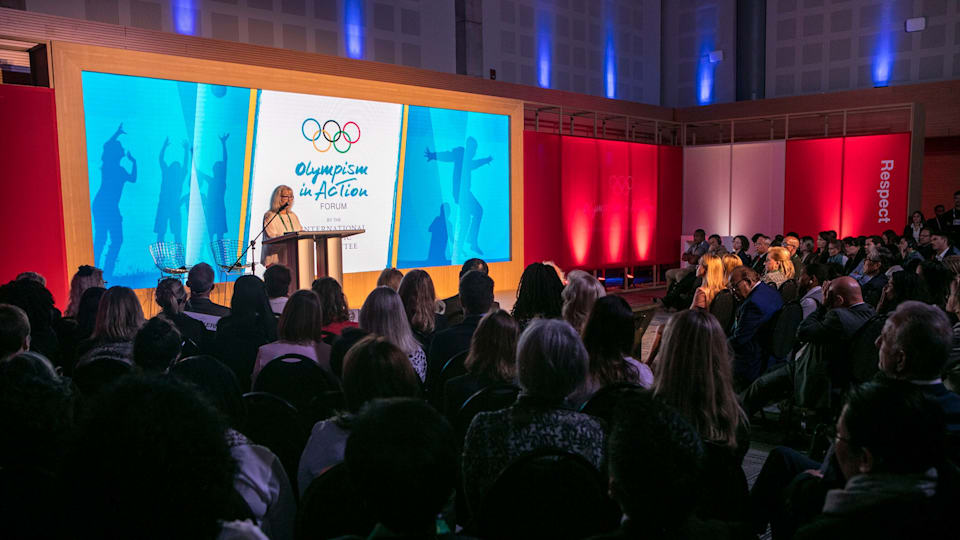Supporting Athletes from Youth Sports to Post-Career Entrepreneurialism
The athletes are at the heart of the Olympic Games: they train for years to compete and live by the Olympic values of friendship, excellence and respect every day. Supporting athletes – not just on the field of play but beyond their athletic careers – is essential for the IOC and the Olympic Movement.

The Olympism in Action Forum examined several topics related to athlete support. There was a video highlighting the forthcoming Athletes’ Rights and Responsibilities Declaration, an athlete-driven initiative developed by athletes, for athletes over the last year. The development and delivery of the Athletes’ Declaration has been led by a 20-person Steering Committee of athlete representatives across the Olympic Movement.
- 10 representatives – International Federations
- 5 representatives – Association of National Olympic Committees
- 3 representatives – IOC Athletes’ Commission
- 1 representative – International Paralympic Committee
- 1 representative – World Olympians Association
The Declaration outlines a common set of aspirational rights and responsibilities for athletes within the Olympic Movement. All members of the Olympic Movement, particularly the International Olympic Committee, the International Sports Federations and the National Olympic Committees, will strive to promote respect for these rights and responsibilities.
Covering topics such as anti-doping, integrity, clean sport, career, communications, governance, discrimination, due process and harassment and abuse, the Athletes’ Declaration will be an evolving document that supports athletes – with their direct input and involvement – for years to come.
The process to create the Athletes’ Declaration was an open one, focused on making the effort one of “by athletes, for athletes”. Over the summer, thousands of athletes added their voices to the development of the Athletes’ Declaration, through a global survey that reached 4,292 participants from 190 countries and more than 120 sports disciplines (including all Olympic and Paralympic disciplines). Respondent demographics were well balanced, with 48 per cent female, 50 per cent male and 2 per cent preferring not to answer/other. Active athletes accounted for 68 per cent of responses, with 61 per cent of respondents aged between 18 and 34.
This extensive and comprehensive athlete survey examined all aspects of the draft document, incorporating 19 rights and 16 responsibilities, that was released for consultation at the end of May. Athletes shared what was most important to them, ensuring their collective voices were fully represented in the process.
The solidarity shown in creating the Athletes’ Declaration is a fundamental concept that underpins the modern Olympic Games. Athletes come together with equal opportunities to compete and be the best. The IOC helps ensure that access to sport and the Olympic Games should be universal, offering financial support to athletes from all backgrounds and nations and helping develop sport worldwide.
The theme of support was woven throughout the panels and talks at the Forum.
In a workshop called “Education & Skill-Building Through Sport”, a panel of experts discussed the intersection of sport and education and how sport can support athletes by reinforcing educational outcomes and teaching fundamental life skills. Vita Balsyte, Director of Olympic Education at the National Olympic Committee of Lithuania, talked about the importance of value-based sporting education, identifying it as “a process where positive attitudes and processes are developed”.
Then, in a wide-ranging conversation, Muhammad Yunus, Nobel Peace Prize Laureate 2006 and Founder of Grameen Bank, spoke to Angela Ruggiero – the CEO and Co-Founder of Sports Innovation Lab, a four-time Olympian in ice hockey and the former Chair of the IOC Athletes’ Commission – about the great potential of elite athletes to become successful innovators and entrepreneurs after their sports careers. They explored ways the Olympic Movement can empower and support Olympians to become entrepreneurs once they have retired.
Then Yunus signed an MoU with IOC President Bach to launch the new Athlete365 Business Accelerator, which will provide excellent opportunities to athletes, through three main phases: Engagement, Incubation and Acceleration.
During the first stage, an online course on entrepreneurship will be available for free to all athletes around the world, accessible through the Athlete365 platform. Subsequently, during the incubation phase, selected athletes who have completed phase one will receive further knowledge and mentorship on entrepreneurship through two dedicated rounds of workshops that are delivered by experts and specialists in this field. Finally, in phase three, a number of athletes, selected on the basis of their project proposals, will receive dedicated and personalised coaching and mentorship for six months for the execution of their project.
In line with Recommendation 18 of Olympic Agenda 2020 and the IOC Athletes’ Commission Strategy, this MoU once again demonstrates the IOC’s commitment to supporting athletes and Olympians during their sporting and non-sporting careers, and is a logical continuation of the investment made by Olympic Solidarity in athlete development worldwide.
Yunus said: “I was looking for social power – in individuals, in governments, in businesses. I’m awed by the power of sport. It gives me goosebumps. Every village in Bangladesh flies the flag of some unknown country when the Olympics or the World Cup comes around. They’re flying with pride Argentinian flags or Brazilian flags. What emotional ties are built through sport. That power is not used for social purposes generally – so that’s what I was looking for.”